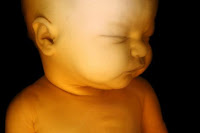Are some babies inherently good sleepers, while others aren’t? Yes to a certain extent this is true. However natural variations are a lot less than most parents think. There are specific patterns of sleep which are universal to most babies and toddlers. This timeline, collated through years of research, will outline these typical sleep patterns. It will explain what sleep behaviour you can reasonably expect of your little one at each stage of their development.
In Utero:
- Nestled in the sleep-inducing womb, the environment is consistent and
 perfect for sleep. It’s dark, warm, quiet, and when you walk or move about, your baby is rocked to sleep.
perfect for sleep. It’s dark, warm, quiet, and when you walk or move about, your baby is rocked to sleep. - Your unborn baby sleeps twenty hours or more each day (Pantley 2009).
- Your baby is used to hearing the comforting sounds of your heartbeat, the gurgling of your stomach, and the soft tones of your voice. Also, he never experiences hunger due to being permanently hooked up to a steady stream of nutrition. As a consequence of these factors, your baby seldom has difficulty falling to sleep (Holland 2004).
- Waking periods are random and for very short periods of time.
- Your baby is a very active sleeper. The kicking and poking sensations that you can feel are often movements made during sleep (Pantley 2009).
- By the seventh month of pregnancy your baby will start to dream as their brain is now developed enough to partake in REM (rapid eye movement) sleep (Murkoff 2009). In REM sleep, the higher centres of the brain receive stimulation from deeper, more primitive areas. Impulses come up the same sensory pathways that are used for sight and sound, and perhaps touch, smell and taste. This state may allow the unborn baby’s developing brain to receive sensory input – to ‘see’ and to ‘hear’ – even before birth! (Ferber 2013).
- During REM sleep, muscular impulses in the foetus are not blocked as completely as they are in children and adults, so the foetus has some ability to practice actual body movements.
- By the eighth month of pregnancy your baby will also partake in non-REM sleep. In this more quiet phase of sleep, your baby makes no breathing motions. Yet if respiratory movements were never practiced, your child would be born with no experience at all in using these muscles that are so necessary to survival. Thankfully, respiratory motions do occur in REM sleep (Ferber 2013).
- Children dream more the younger they are (Einon 2004). 90% of the sleep of premature babies is spent in REM sleep (Hames 1998). Unborn babies dream most of all. What does a foetus’ dream about? We can never know. Maybe just flashes of sounds and murky sights.
- If you’ve had a 4D scan, you may have noticed your unborn baby ‘smiling’ in their sleep. This is because during REM sleep, facial muscles can twitch, producing ‘sleep grins’ (Sears 2009).
- Your baby is ‘nocturnal’. He is most active during the night time as there is more room to move, and less soothing rocking motions to pacify him.










